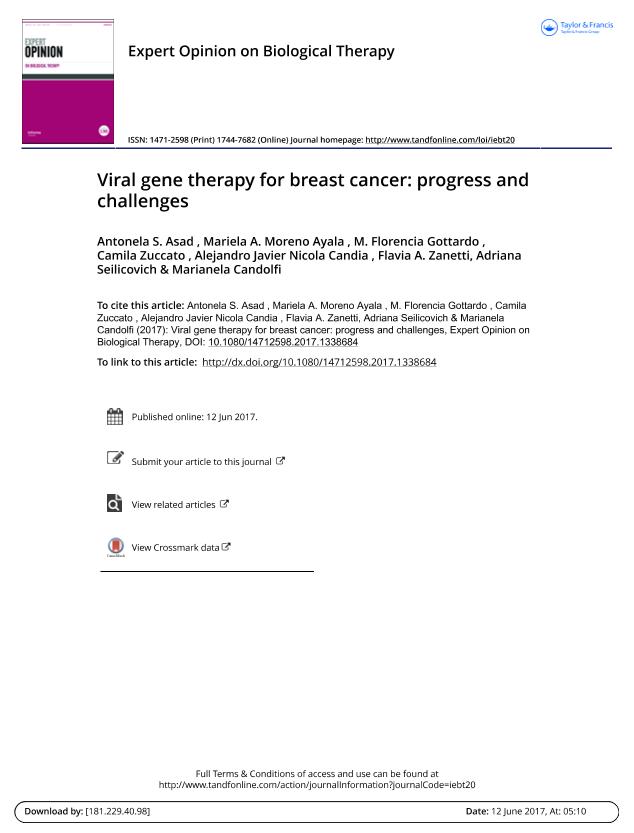Artículo
Viral gene therapy for breast cancer: progress and challenges
Asad, Antonela Sofía ; Moreno Ayala, Mariela Alejandra
; Moreno Ayala, Mariela Alejandra ; Gottardo, María Florencia
; Gottardo, María Florencia ; Zuccato, Camila Florencia; Nicola Candia, Alejandro Javier; Zanetti, Flavia Adriana
; Zuccato, Camila Florencia; Nicola Candia, Alejandro Javier; Zanetti, Flavia Adriana ; Seilicovich, Adriana
; Seilicovich, Adriana ; Candolfi, Marianela
; Candolfi, Marianela
 ; Moreno Ayala, Mariela Alejandra
; Moreno Ayala, Mariela Alejandra ; Gottardo, María Florencia
; Gottardo, María Florencia ; Zuccato, Camila Florencia; Nicola Candia, Alejandro Javier; Zanetti, Flavia Adriana
; Zuccato, Camila Florencia; Nicola Candia, Alejandro Javier; Zanetti, Flavia Adriana ; Seilicovich, Adriana
; Seilicovich, Adriana ; Candolfi, Marianela
; Candolfi, Marianela
Fecha de publicación:
08/2017
Editorial:
Taylor & Francis
Revista:
Expert Opinion On Biological Therapy
ISSN:
1471-2598
Idioma:
Inglés
Tipo de recurso:
Artículo publicado
Clasificación temática:
Resumen
Introduction: Breast cancer is the most common cancer in women all over the world. Furthermore, up to one third of breast tumors develop metastases that are resistant to standard therapies. Gene therapeutic strategies have been developed in order to specifically target cancer cells either directly or through the stimulation of antitumor immunity. Areas covered: This review describes the therapeutic strategies that are currently under development to treat this disease using engineered viral vectors including: adenovirus, adeno-associated virus, lentivirus, poxvirus, reovirus, baculovirus, herpesvirus and oncolytic viruses. Advantages and disadvantages of these multiple gene therapy platforms are discussed in detail. Expert opinion: Metastatic breast cancer is a perfect candidate for gene therapy approaches due to the presence of several tumor antigens and the aberrant expression of many molecular pathways. Oncolytic vectors are able to attack tumor cells while sparing normal cells and their activity is often enhanced by the administration of chemotherapy. However, more efforts are needed in order to reduce toxicity and to achieve better transduction efficiency. Improved preclinical models and a more critical patient selection for clinical trials, along with advances in gene therapy regulations, will surely facilitate the evolution of gene therapy for the treatment of metastatic breast cancer.
Archivos asociados
Licencia
Identificadores
Colecciones
Articulos(ICT - MILSTEIN)
Articulos de INST.DE CS. Y TECNOLOGIA "DR. CESAR MILSTEIN"
Articulos de INST.DE CS. Y TECNOLOGIA "DR. CESAR MILSTEIN"
Citación
Asad, Antonela Sofía; Moreno Ayala, Mariela Alejandra; Gottardo, María Florencia; Zuccato, Camila Florencia; Nicola Candia, Alejandro Javier; et al.; Viral gene therapy for breast cancer: progress and challenges; Taylor & Francis; Expert Opinion On Biological Therapy; 17; 8; 8-2017; 945-959
Compartir
Altmétricas



